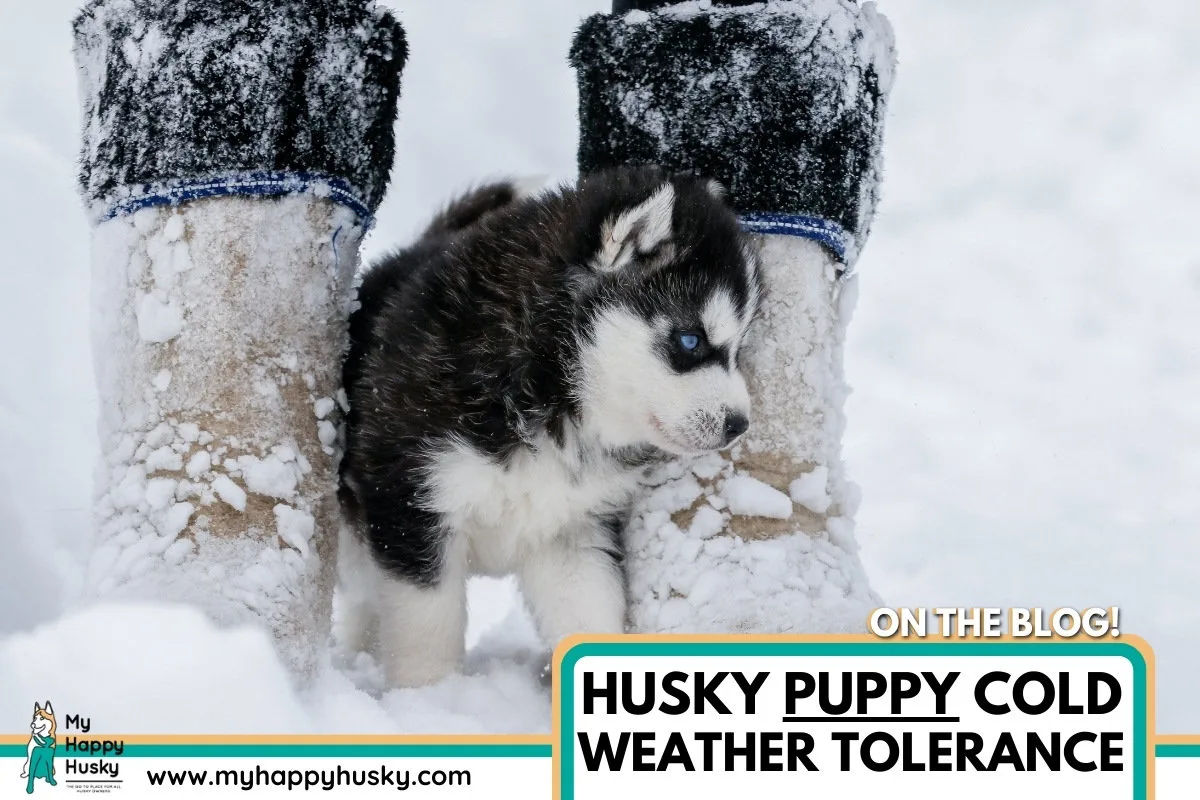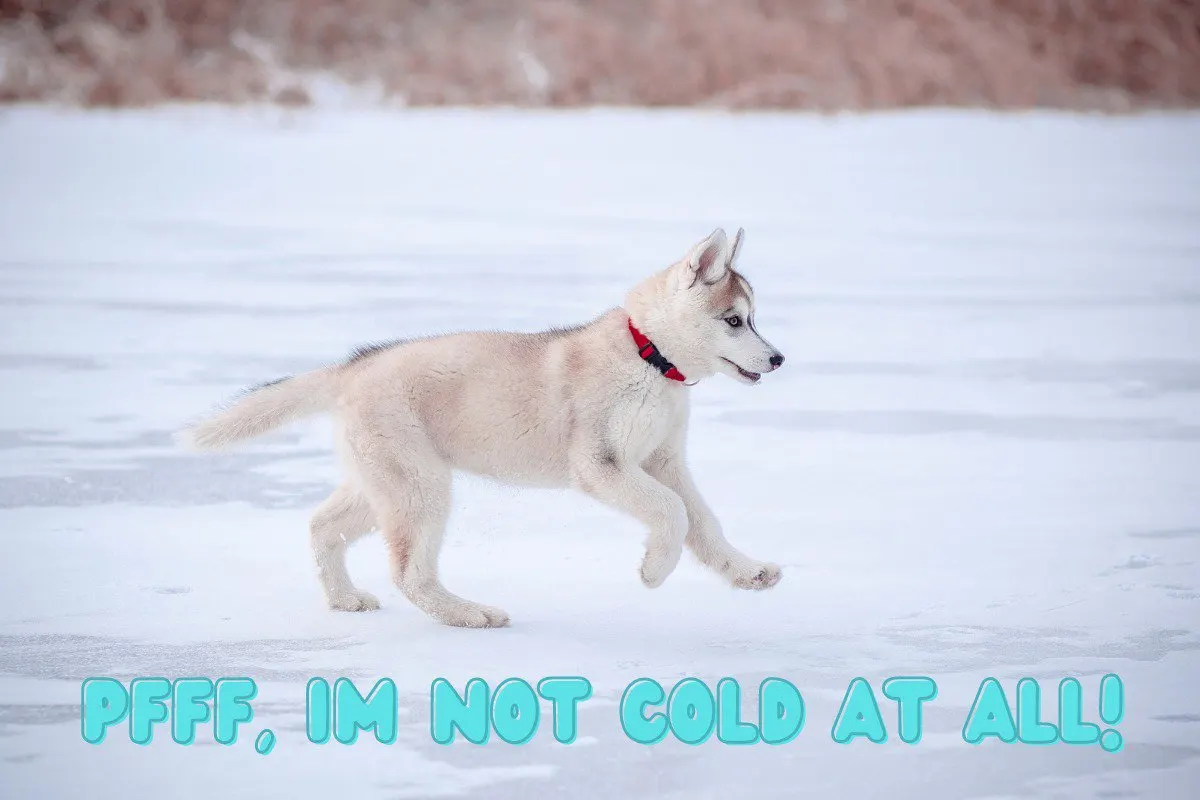Hello there, fellow puppy parents! Today we’re going to discuss a topic that’s both crucial and often misunderstood — just how cold is too cold for a husky puppy?
If you’ve chosen to bring one of these cute little fluff balls into your home, it’s important to know just how well they handle the cold.
Yes, they’re huskies, but at such a young age do they still have the same resilience to cold weather?

The Husky Breed: A Quick Overview
With their thick double coats and long history of living in arctic-like conditions, huskies are built for cold weather, there is no doubt about that…
However, it’s critical to remember that husky puppies aren’t as resilient as their adult counterparts.
Adult huskies are capable of enduring temperatures as low as -60 degrees Fahrenheit, as noted by the American Veterinary Medical Association (AVMA). But let’s not get ahead of ourselves — your husky is still a puppy, and we need to tread carefully when it comes to cold temperatures.
What’s the Ideal Temperature for Husky Puppies?
The perfect temperature for a husky puppy ranges between 50 and 60 degrees Fahrenheit.
While adult huskies can comfortably enjoy cooler temperatures, puppies lack the full double coat that keeps adult huskies warm. Therefore, they can’t handle the same degree of cold.
This ideal temperature range is supported by PetMD, which also provides comprehensive guides on maintaining the health of your husky puppy in various conditions.
What’s Too Cold for a Husky Puppy?
While there isn’t a universally agreed-upon “lowest temperature” for a husky puppy, many experts suggest not exposing them to temperatures below freezing (32 degrees Fahrenheit or 0 degrees Celsius) for extended periods.
This guideline is due to their still-developing double coat, which doesn’t offer the same protection as an adult Husky.
However, remember that tolerance to cold can vary widely among individual dogs, and always monitor your puppy for signs of discomfort or distress.

How to Tell If Your Husky Puppy Is Too Cold
It’s not always easy to gauge whether your husky puppy is feeling the chill. Here are some telltale signs to watch out for:
- Shivering: This is one of the most common indications. If your puppy is shivering, it’s time to warm them up.
- Whining or appearing anxious: Puppies can’t communicate verbally, so they show their discomfort through behavior.
- Slow movements or lethargy: If your puppy seems less energetic than usual, it might be due to the cold.
For a detailed understanding of how to read your dog’s signs, check out this resource from VCA Hospitals.
How to Keep Your Husky Puppy Warm
Now, let’s talk about how we can ensure our husky puppies stay comfortable during the colder months.
Proper Shelter
Whether your puppy spends most of its time indoors or outdoors, providing a warm and cozy shelter is essential. A good puppy bed with warm blankets will do the trick for indoor dogs. For outdoor pups, consider a well-insulated dog house.
Adequate Nutrition
Feeding your husky puppy a balanced diet helps them maintain body heat. Puppies require more calories during colder months, so consider increasing their food intake. The RSPCA provides an excellent guide on feeding puppies in different weather conditions.
Layer Up
Consider doggy sweaters or coats. Yes, even for huskies! Remember, your husky puppy doesn’t have a fully developed coat yet, so a little extra help can go a long way.
When to Seek Professional Help
If your husky puppy displays extreme discomfort or hypothermia symptoms (like lethargy, weak pulse, or shallow breathing), seek immediate veterinary help. The cold can be dangerous, and it’s better to be safe than sorry.
Expert Opinions
Renowned pet expert Dr. Karen Becker emphasizes the importance of understanding your puppy’s specific needs. “All huskies, even puppies, are built for cold weather. But it doesn’t mean they should be exposed to extreme temperatures without precautions,” says Becker. You can read more about her take on husky puppies and cold weather on her blog.
Frequently Asked Questions
Lastly, let’s go over a few frequently asked questions to help you better understand your husky puppy’s needs during the cold.
Can Husky Puppies Sleep Outside in the Cold?
While adult huskies can handle sleeping outdoors in cold climates, puppies should not. They lack the fully developed double coat of adult huskies and are much more vulnerable to the cold.
Do Husky Puppies Need Extra Care During Winter?
Yes, they do. While their breed is known for withstanding cold climates, husky puppies need extra care during winter. This can include additional feeding, suitable clothing, and warm, comfortable shelter.
Can Husky Puppies Get Frostbite?
Unfortunately, yes. Although it’s less common in huskies than in other breeds, husky puppies are susceptible to frostbite on their ears, tail, and paws due to their lack of a fully developed coat.
Wrapping It Up
In conclusion, while husky puppies are more tolerant of cold weather than many other breeds, they still need special attention during cold months. Keep an eye on their behavior, provide a warm environment, and adjust their diet as needed. Most importantly, remember that while huskies are built for cold weather, your husky is still a puppy. We hope this guide helps you keep your husky puppy happy and healthy, no matter the temperature!
Remember, when in doubt, always consult with a professional, like your local vet or an expert from the AVMA. They can provide personalized advice tailored to your husky puppy’s needs. Stay warm, and happy puppy parenting!
Sources:
Disclaimer
The advice given in this article is for educational purposes only and does not constitute professional advice in any context. Before making any decisions that may affect the health and/or safety of your dog, you should always consult a trained veterinarian in your local area. For the FULL disclaimer Visit HereCopyright Notice: The content produced and published on My Happy Husky is unique and original. My Happy Husky makes an active effort to search for plagiarized content using plagiarism detection software. If plagiarized content is found, action will be taken.
